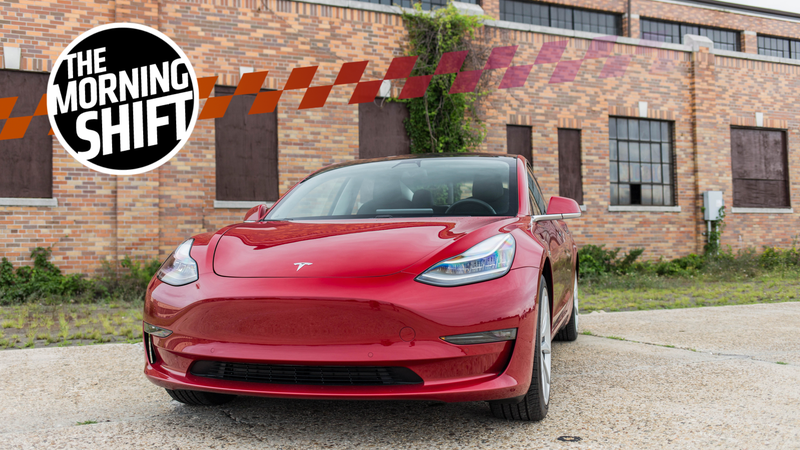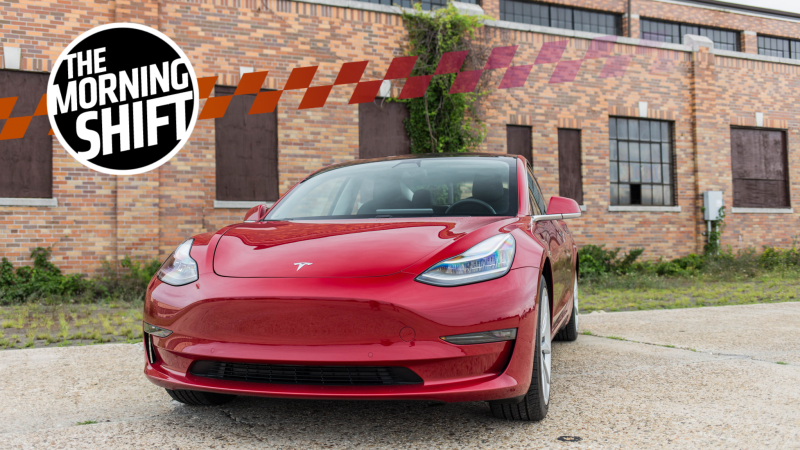
 The Morning ShiftAll your daily car news in one convenient place. Isn’t your time more important?
The Morning ShiftAll your daily car news in one convenient place. Isn’t your time more important? Electric-vehicle production, fights over fuel-economy standards, earnings reports, unprovoked car fires and Aston Martin’s Brexit headaches—all of this and more in The Morning Shift for Thursday, Oct. 25, 2018.
1st Gear: Tesla Wants to Take Some Model 3 Production to China
Tesla made a profitin the third quarter of this year, but that wasn’t the only news from Wednesday. TechCrunch reports that it wants to ramp up production in China, including taking portions of Model 3 production there next year.
Tesla, which says a lot of things, said Wednesday that it will start taking orders for the Model 3 from China and Europe before the end of the year, and that it’ll start delivering the car to Europe by early 2019. The company also wants to have portions of Model 3 production in China in 2019, and said in its earnings report that “production in China will be designated only for local customers.”
Tesla has plans for a huge factory in Shanghai to build 500,000 vehicles per year, which it spent $140 million buying land for, but TechCrunch reports that construction hasn’t started on it yet. From the story:
Tesla said earlier this month it plans for as rapid build out of a factory in China. But there’s something new here. The term “portions of Model 3 production” is the important phrase. This could be referring to a term used in the manufacturing world known as a complete knock down. CKD is basically a kit of non-assembled parts of a product, like say a Model 3. It’s a strategy used to avoid tariffs when shipping to foreign countries. […]
Tesla warned in its production and delivery report in early October that tariffs, combined with the cost of shipping its vehicles via ocean carrier and the lack of access to cash incentives available to locally produced electric vehicles, has put the company at a disadvantage in China. Tesla reiterated those cost constraints in its third-quarter earnings report.
Advertisement
We’ll see what happens.
2nd Gear: California’s Still Fighting the Trump Administration
In an argument that’s lasted longer than that time in high school when you gave your parents the silent treatment for more than a week, California and the Trump administration are still at it about fuel-economy standards.
Advertisement
Bloomberg reports that California and 18 other states will file a formal response in their fight with the administration to the Environmental Protection Agency and the U.S. National Highway Traffic Administration Friday, which Bloomberg reports is the deadline for public comments on the administration’s plan.
The Trump administration’s plan, put simply, is to freeze the Obama-era fuel-economy standards at 2020 levels through 2026. The progressively stricter fuel standards from the Obama administration would have put 2026 levels for fleets of new cars around 50 mpg on average, but freezing standards in 2020 would freeze those levels at 37 mpg through that year. The Trump administration also wants to revoke California’s ability to make stricter fuel-economy rules than the federal government, and its ability to mandate electric-car sales.
California, and 18 other states that Bloomberg reports make up about a third of the U.S. vehicle market together, aren’t having any of that. From Bloomberg:
The Trump plan violates the Administrative Procedures Act, which requires extensive documentation before an existing regulation can be overturned, and the EPA’s statutory obligation to reduce harmful pollution, [California’s attorney General Xavier] Becerra said. […]
Lisa Madigan, the Illinois attorney general who joined Becerra on the call, described as “dubious” the Trump administration’s claim that the rollback will save lives.
According to Trump officials, freezing the requirements will slow the pace at which new cars are getting more expensive, and therefore allow people to replace older and less-safe vehicles more rapidly.
Advertisement
Bloomberg reports that Madigan said she thinks the rollback will be defeated, and that freezing standards would “lead to dirtier air, cause people to pay higher prices at the pump, and increase the cost of climate change.”
3rd Gear:Ford’s Earnings Fall, but Crossovers and SUVs Seem to Be Working
Overall, Ford didn’t do so well in its third-quarter earnings thanks to poor performance in China and other overseas markets, posting a 37-percent drop in net income. But revenue rose 3 percent thanks to higher-profit vehicles in North America, it said—you know, the big crossovers and SUVs everyone’s buying.
Advertisement
But everything is great, totally great, for the future at Ford, it said. From Automotive News:
“We’ve had an extremely productive quarter in terms of putting building blocks in place,” [Ford CEO Jim] Hackett said on a conference call. “We’re addressing real issues and we’re moving quickly to redesign the business in support of our stated strategy.”
But Ford said its challenges overseas, as well as higher costs and uncertainty clouding the entire auto industry, mean it no longer forecasts achieving the 8 percent profit-margin target it set previously. CFO Bob Shanks declined to offer an alternate timeframe for reaching that threshold.
“We don’t see, at the moment, a way to get there,” Shanks told analysts. “Certainty we’re trying to get there as fast as we can. I’m not going to put a timeframe on it because I don’t want to go back and have to change it.”
Advertisement
As far as future plans go, Hackett said that everyone can just hurry up and wait.
“We’re fully committed to sharing details as soon as we can, but I can’t allow us to get ahead of the process,” Automotive News quoted him as saying during a conference call. “The need to get our stakeholders up to speed is the priority for me and the entire company.”
4th Gear: Hyundai and Kia Trying to Decide How to Respond to U.S. Senate
In the past few months, more than a couple hundred Hyundai and Kia owners have reported random fires in the engine bays of their cars. It’s getting to the point that the U.S. Senate Commerce Committee wants the automakers to come for a hearing about it next month, but Automotive News reports that they’re still trying to decide how to respond to all of that.
Advertisement
Automotive News didn’t say exactly what the automakers are trying to decide upon, only that they’re “still weighing” the call and that they’re “considering how to best respond to the request they talk before lawmakers in Washington.”
A national advocacy non-profit called the Center for Auto Safety has formally called out the non-collision fires at least twice, once in a petition to the U.S. National Highway Traffic Administration in June and again to the automakers earlier this month. When that most recent demand from the center came out, a Hyundai spokesperson told Jalopnik that it already addressed the problem in two separate recalls—one in 2015 and one in 2017.
But the call for a Senate hearing came after the most recent move the center made, and Automotive News talked to Hyundai Motor Company CEO Won Hee Lee and Kia Motors CEO Han Woo Park about the call recently.
Advertisement
They’re figuring out how to respond, they said. From Automotive News:
In the meantime, they said, Hyundai and Kia are coordinating with NHTSA, the nation’s top auto safety regulator, to ensure safety and to identify root causes of the reported fires.
“We are in the process of responding to this recent inquiry regarding vehicle fires,” Kia’s Park said. “The technical finding is the first. The first step is fact finding.”
Hyundai’s Lee said the matter is a top priority and added that Hyundai and Kia rank below average in the number of noncollision fires reported in the U.S. market.
Advertisement
Even still, Lee told Automotive News, Hyundai has “to handle that issue very seriously.”
5th Gear: Aston Martin May Change Up Parts Deliveries to Deal With Brexit
In case you were curious about the small details making up your next Aston Martin purchase, Reuters reports that Aston’s considering switching around how it gets parts deliveries after Britain leaves the European Union.
Advertisement
Aston mostly uses the Port of Dover in the UK for its moving components, Reuters reports, but CEO Andy Palmer said there are worries that it won’t be able to handle all of the new customs checks after Brexit. The company could switch ports or start flying in parts to deal with it, but it would cost more.
But building cars means the company makes more money than not building them at all, Palmer told Reuters:
With Britain due to leave the European Union on Mar. 29, Palmer said the plan would have to be approved by the board by the end of the year, in an example of decisions executives are needing to take without clarity on what Brexit will mean.
“There is undoubtedly a cost associated with it, but it’s cheaper than not building cars,” he said.
Advertisement
Palmer said he “simply work[s] to the worst and hope[s] for the best.”
Reverse: An Unexpected Formula One Champion
John Surtees won the Formula One drivers’ championship on Oct. 25, 1964 at the Mexican Grand Prix, according to ESPN, after the driver dominating the race and looking to win the title, Jim Clark, had an oil leak with only a few laps to go.
Advertisement
Clark’s engine seized up on the last lap, giving Surtees, who was ill before the race, the title.
Neutral: How Are You Feeling on These Hyundai/Kia Reports?
Do you have on in the garage? Does it make you at all uneasy, or are you just taking whatever life throws at you?













